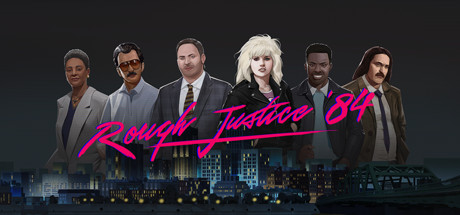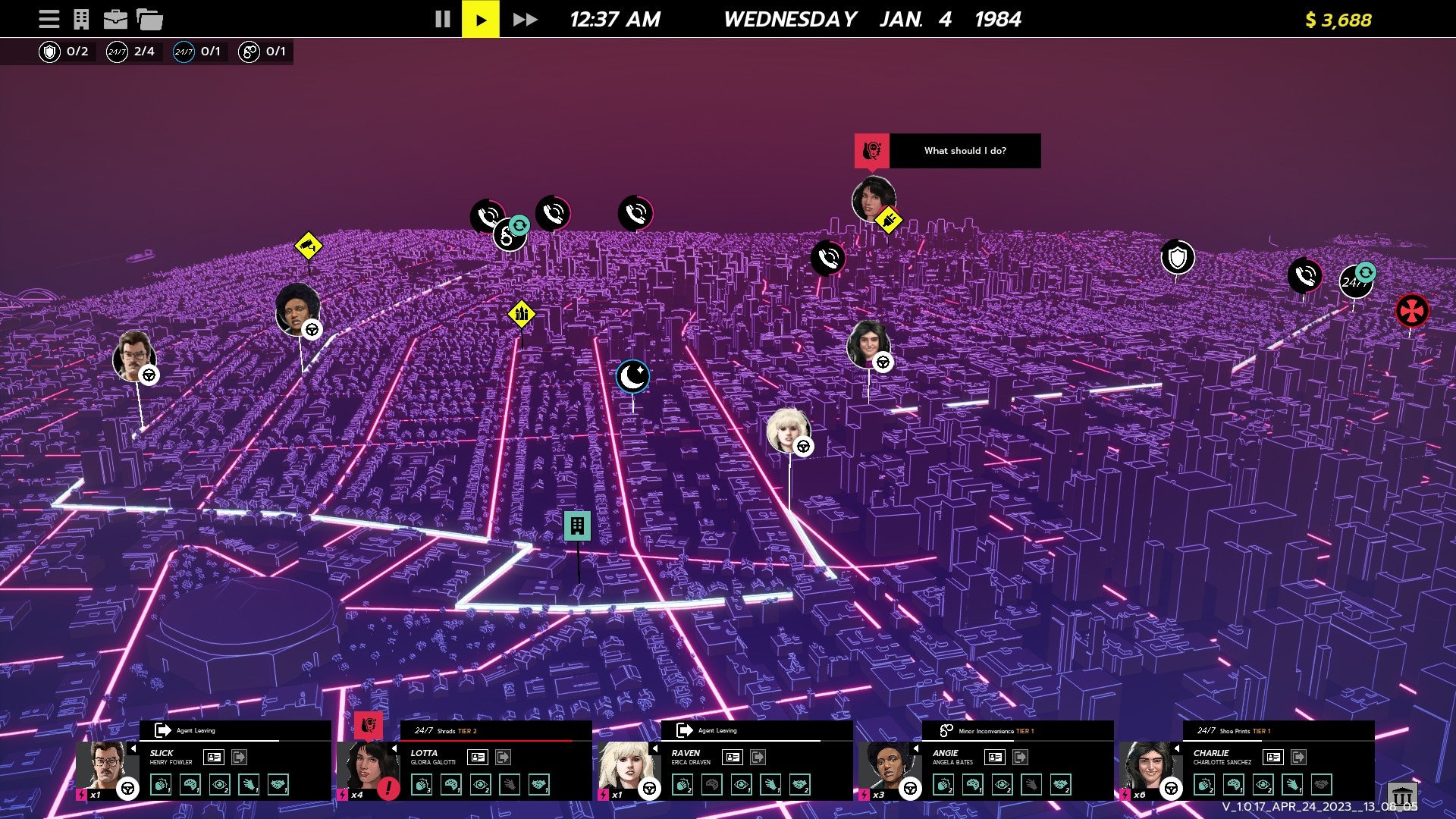
Rough Justice: ’84
Rough Justice: ’84 is a casual strategy / management game with mechanics heavily inspired by board games. Although a board game with a similar name exists, the two have different concepts and playstyles.
In Rough Justice: ’84 you take on the role of Jim Baylor, a super cop that has just been released from prison after being wrongfully accused and jailed for several years. Seeing that the crime rate of Seneca City has considerably increased while he was out of duty, he decides to accept his friend’s proposal of running a private detective agency together with him and help serve justice to the bad guys.

The gameplay loop will have you accept various types of cases and hire agents to send them on missions to counter these crimes. The agents have different skill sets and for an optimal result, you’ll want to try matching their skills with the requirements of the mission. Depending on the type of case handled by the agent, upon arrival to their objective, you’ll be presented either with a random minigame or with a dice roll that will decide the outcome of the mission – whether it will be a successful one or not. While the minigames require various degrees of skill and also have to be completed under a time restriction, the dice rolls are mostly subjected to randomness – although you can still try to maximize the draws by sacrificing some of the agent’s action points.

Each agent you hire has a specific amount of energy points that they can spend on traveling to their objective or completing missions. This value is rather small, usually allowing them to engage only in 2-4 missions before they need to return to the headquarters and free up one agent slot. As such, one core gameplay mechanic is to continuously hire agents (as long as you have open slots) and send them to cases until their energy depletes completely. Every time you hire an agent (whether it’s a new one or someone you hired before but who returned to the headquarters to rest), you’ll have to pay a certain amount of money, thus you’ll want to ensure that the majority of the cases you send them to are successful so that you can at least recoup your financial investment.

Part of the gameplay is balancing out all these aspects: the money you spend on agents vs. how much you gain from missions, what agents to send to missions so that their skillset will provide the best outcome possible, managing their energy points by optimizing their routes, what kind of cases to accept so that you get equal progress with all the case givers, etc. Unfortunately, the player is given rather little power over these decisions, because, in fact, pretty much all the mechanics rely heavily on RNG. To make things even more chaotic, randomly triggered events will make you choose between two negative outcomes, setting your progress back by a few hours. The general feeling that I had during the time I spent in-game was that I was almost never in control of the game; instead, I was only allowed to steer it in one direction or another, with the final outcome still decided by the gods of randomness.

Aside from accepting cases and completing them, a small campaign is also available. Its stages use the same mechanics as the regular cases and don’t differ much from these aside from the fact that you’ll get to experience a sequence of cutscenes, choices, minigames and dice rolls in one go instead of one at a time as it happens with individual missions. However, progressing through the campaign is heavily gated by the reputation you have with the case givers. This essentially means that you will have to grind cases for a couple of hours until you’ll be able to access the next stage in the campaign. Accepting a case and not completing it or failing it will give you negative reputation points with that specific quest-giver, and the aforementioned random events will also heavily influence (usually negatively) your reputation with them. Increasing your reputation will be quite a struggle (and your main struggle) in the game, and don’t forget that even if you progress a bit with that you shouldn’t be proud of yourself since the game can decide to set you back by a mile at any moment.

While there are a lot of minigames to play and a good range of cases, the gameplay quickly becomes very repetitive because the game loop is very short: accept a case, send an agent, play a minigame or roll a dice, rinse and repeat. Even with the campaign spawning over five chapters of six missions each, the gameplay still feels rather thin because there’s not much exciting or out-of-the-ordinary happening. The achievements are also designed to encourage grinding. For 100% completion, you’ll be required to solve 1000 cases of each type and level your agents to the maximum; based on my current gameplay, I would estimate these to take several hundred hours.

It’s a great game to chill / time-waste for a few hours in a session though, if you don’t mind its repetitiveness. Rough Justice: ’84 has a way of putting you into a routine trance of accepting and solving cases, but I wouldn’t say that it offers a very deep experience. It’s certainly a very decent game, enjoyable in some ways and less enjoyable in others. Perhaps the best part of the game is the strong 80’s vibe that it gives through its writing and its synth-wave graphics and soundtrack.
Disclaimer: This review is based on a press preview copy of the game, kindly provided by Gamma Minus UG via The Indie Game Collective.